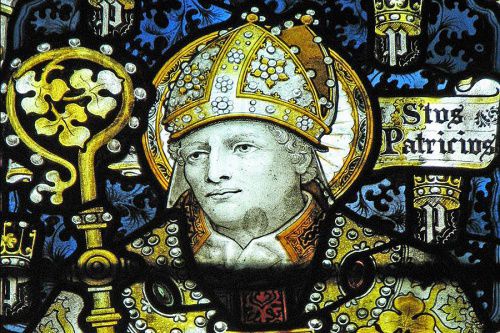When St. Patrick was a boy of 8 years old, he was kidnapped by pirates. He was sold into slavery in Ireland. He was put to work as a shepherd boy. He was lonely and miserable.
He prayed to God to deliver him. Ten years later, at age eighteen, Patrick received a message in a dream. The dream told him, simply, to go down to the seashore and get on a boat. Shortly after doing so, he was reunited with his family.
He studied to become a monk and a priest. Decades later, he received an inspiration in prayer to go back to Ireland to bring the Gospel to the Irish. Then in his fifties, he went to Rome to ask permission from the Pope.
In those days all educated people spoke Latin, the language of the Roman Empire. St. Patrick’s competition spoke eloquently, in good Latin. The other man was successful in preaching against heresies, which was a frequent concern in the Church in 432 AD. St. Patrick's Latin was terrible. St. Patrick did not make a good impression. They thought, how can he make a good bishop? Christians speak Latin. St. Patrick answered: "I'll be a missionary bishop. I am not the bishop for the Christians. I am a bishop for the pagans!"
This was a new idea. The other man got the job. He was promptly martyred. Two years later, St. Patrick was back again. The second time he got the job. One lesson here is — Don't give up. If you run into roadblocks or defeat, but you know you are right, don't give up.
Previously, Christians were ignored in Ireland. St. Patrick was noticed. Using his crozier (shepherd’s hook), he struck down statues of pagan gods. The Irish loved his iconoclasm.
Every spring there was a festival. On the last night, all fires would be put out in Ireland. Then the High King of Ireland would light his fire. Those who could see the High King's hill, would light their fires next. Light and fire would spread throughout Ireland from the High King.
St. Patrick set up on a hill close to the High King. St. Patrick lit an Easter fire before the High King. That night, St. Patrick tricked all the pagans into lighting an Easter fire. The High King was furious! St. Patrick was arrested.
A prophecy held that a new kingdom would come to Ireland in the reign of the current High King. The High King interrogated St. Patrick in front of all the nobles. St. Patrick stated, "My kingdom is not of this world." During his interrogation, St. Patrick was able to preach. Many of the young were inspired by him and converted. Since Patrick was not a political threat, the High King was also satisfied. He allowed St. Patrick to preach throughout Ireland. All Ireland converted to Christianity in one generation.
Subsequently, the Irish were on fire with Christian fervor. The Irish monks, who read all 150 psalms every day, were thought by others to be fanatics. The Irish farmers wanted to participate, but they could not read the Bible while guiding a plow. The monks advised them that the Our Father was a perfect prayer, and could substitute for any psalm. The monks gave the farmers strings of beads, and told them they could say one Our Father on each bead. These strings of beads later evolved into the rosary. Frequent confession, as opposed to once in a lifetime, was also an Irish innovation.
While Christianity took Ireland by storm from 430 to 480 AD, the Roman Empire disintegrated in 476 AD. Barbarians overran Europe. Roman government collapsed. Christianity practically vanished. Literacy and civilization ceased to exist in Europe north of the Alps. Very few were left in Europe who could read or write, as the barbarians did not know Latin.
Irish monks then set out from Ireland to re-Christianize and re-civilize Western Europe from about 500 AD to 1100 AD. They went first to Great Britain. Beginning with St. Columban in 612 AD, Irish monks spread out across France, Germany and the rest of Europe. They taught both Christianity and literacy in Latin.
Barbarian Kings sought out Irish monks so they could set up schools and centers of learning. The monks in monasteries recopied classical texts, both sacred and secular. This is why the classical texts of Greek and Roman literature come down to us today. Under the influence of Irish monks, the Frankish chieftains went from squabbling warlords to Charlemagne — the first Holy Roman Emperor. Throughout France and Germany today you can still find churches dating back many centuries with Irish names. St. Finbar — what's he doing here? Now you know.
Over the centuries, a vast river of Irish priests and nuns have spread out all across the globe. In Los Angeles you can find Irish priests speaking Tagalog, Korean and Spanish, often with an Irish accent. When St Patrick was kidnapped, it seemed a terrible disaster. Many centuries later, much good has come of it. God had a wonderful plan to bring good out of evil.

